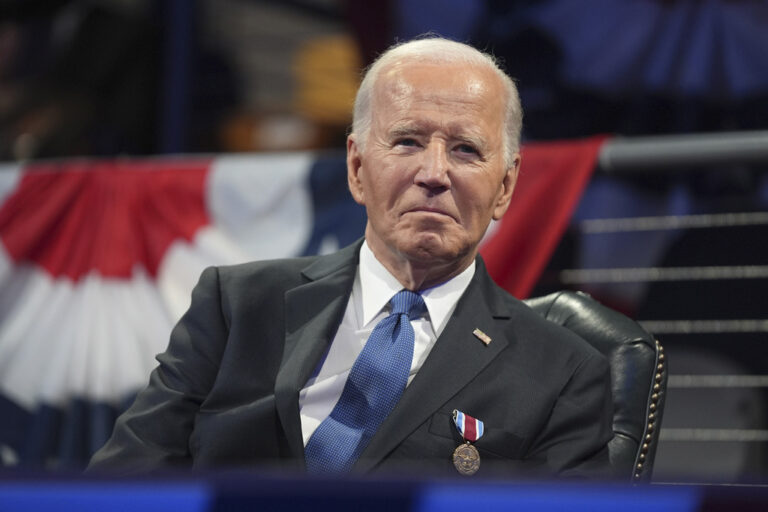 Republicans call the Supreme Court’s latest ruling on campaign donations a victory for free speech. Democrats say it’s more like a win for the wealthy.
Republicans call the Supreme Court’s latest ruling on campaign donations a victory for free speech. Democrats say it’s more like a win for the wealthy.
Either way, it’s likely to benefit the two major political parties and their candidates for Congress, who are now able to seek donations from deep-pocketed contributors who can give more without running afoul of the law.
The court “has once again reminded Congress that Americans have a constitutional First Amendment right to speak and associate with political candidates and parties of their choice,” Senate Republican leader Mitch McConnell of Kentucky said Wednesday after the court struck down a limit on the amount donors may give to candidates, party committees and political action committees combined.
He added that the court’s ruling makes it clear that it is the “right of the individual, and not the prerogative of Congress, to determine how many candidates and parties to support.”
Yet two Senate Democrats told a news conference the ruling was another in a string of decisions by a conservative court majority that strengthens the ability of wealthy donors to have an impact on politics. “It advantages wealthy people over everybody else,” Sen. Chuck Schumer, D-N.Y., said.
Said Sen. Sheldon Whitehouse, D-R.I., “We see the Supreme Court behaving in a way that would be matched if the five conservative judges made it a strategy to go off and sit in a room by themselves and decide how best to implement the Republican agenda and then came out and did it.”
The court’s 5-4 ruling was a fresh declaration that many limits on big-money contributions violate the givers’ free-speech rights, continuing a steady erosion of the restrictions under Chief Justice John Roberts. The biggest of those rulings was the 2010 decision in the Citizens United case that lifted restrictions on independent spending by corporations and labor unions.
In particular, Wednesday’s decision voided the overall federal limit on individuals’ contributions — $123,200 in 2013 and 2014, broken down as $48,600 to all candidates combined and $74,600 to all party committees and political action committees in total. Limitations on the amounts a donor may give an individual candidate or committee remain in effect.
Republicans and Democrats alike said that on its own, the decision does not inherently give either major political party an advantage.
Fred Malek, a veteran Republican fundraiser, said one likely effect would be to widen the number of competitive races, since donors will be free to spread their money more widely.
John Jordan, the CEO of a California winery and a wealthy Republican donor, said: “I’ll bet you a lot of money it won’t impact the dynamics of overall spending. Maybe you can write more $2,600 checks. But even if you wrote a check for every race that still isn’t that big.”
Wade Randlett, a California-based Democratic donor, said he didn’t expect the ruling to have a great influence on “ideological” donors who only support members of one party. But he said contributors seeking to influence specific legislation would now have an incentive to donate to a broad range of lawmakers on a specific committee or involved with a certain issue. “You can give to anybody on both sides who has any relevance over your issue,” he said.
Only 646 out of millions of donors in the election cycle of 2011-12 gave the now-defunct legal maximum, according to the Center for Responsive Politics. The ruling will “mean there will be much greater emphasis by the campaigns and the parties on those donors with the biggest checkbooks who can make those very large contributions,” said Bob Biersack, who works for the Center and is a 30-year veteran of the Federal Election Commission.
Cleta Mitchell, an election lawyer for Republicans, said the court’s ruling means that various party committees and candidates no longer will have to vie for money from the same contributors. The law permits a donor to contribute $5,200 for the primary and general election combined to any candidate, and if they gave the maximum, they could donate only to nine office-seekers before reaching the $48,600 limit to all federal office-seekers.
Similarly, while Republicans and Democrats in Washington each maintain a national party committee, a Senate campaign committee and a House campaign committee, a donor could give the maximum allowable amount to only two of the three without violating the overall limitation the court discarded.
Now, Mitchell said, “the donors get to choose obviously, but the committees don’t have to feel like they’re pinching another party’s donors.”
Ryan Call, a campaign finance attorney who is chairman of the Colorado Republican Party, said the court’s ruling will be a boon to state parties, which he said have been neglected previously because donors hit the overall spending limit before they could distribute funds lower on the political food chain.
“We have lots of optimism that this new decision would enable people who want to support us to do so,” Call said.
Under the court’s ruling, a donor could donate the maximum $10,000 a year to each of their party’s 50 state committees, or a total of $1 million during a two-year election cycle — and still donate to candidates as well as national party committees and political action committees.
The ruling does not affect a parallel system in which individuals donate unlimited amounts, sometimes undisclosed, to certain outside groups. Biersack said the same small group of 646 donors gave a total of about $93.4 million in the last campaign.
Their largesse will still be avidly sought, as Republican presidential hopefuls recently demonstrated by traveling to Las Vegas to meet with casino magnate and conservative donor Sheldon Adelson.
(AP)











3 Responses
The Democrats prefer to get their money from labor unions in states such as New York and California where union membership is frequently mandatory – in effect union dues in those states are a form of tax, going straight to the Democratic machine. Given the Wall Street and Mass media (Hollywood) are generally Democratic, the Democrats are simply whining. Frankly, the Democratic machines would prefer a system with no private campaign spending, such as is the case in places such as Cuba and North Korea. Private donations are what makes the difference between the USA and dictatorships.
In theory, it is reasonable to be concerned about a political sysetm where we have the best politicians our money can buy. In reality, though, the limits are meaningless anyway to most of us. It’s not like we’re contributing up to the max and now some rich folks are going over so we’re losing our voice.
But, as Winston Churchill is alleged to have said, democracy is the worst form of government, except all others that have been tried.
Both parties are full of filthy rich people to pay the bills. For every Koch there is a Soros. In America, the distinctions between the parties are not based on class or wealth. The “fat cats” are equally likely to be Democrats as Republicans. Neither party is underfunded. At no point in American history has there been a party of the rich versus a party of the poor. There are regional differences, sharp urban-rural differences, and religious differences (not so much in terms of which religion supports which party, but in terms of piety levels). But money is not what distinguishes American parties. This is probably because Americans no matter how poor they are, can aspire to get rich – our 1% are not the children of the 1% from 50 or 100 years ago — being WASP “old stock” doesn’t even correlate positively with wealth (whereas, for example, being of Norman ancestry still correlates with wealth in England).